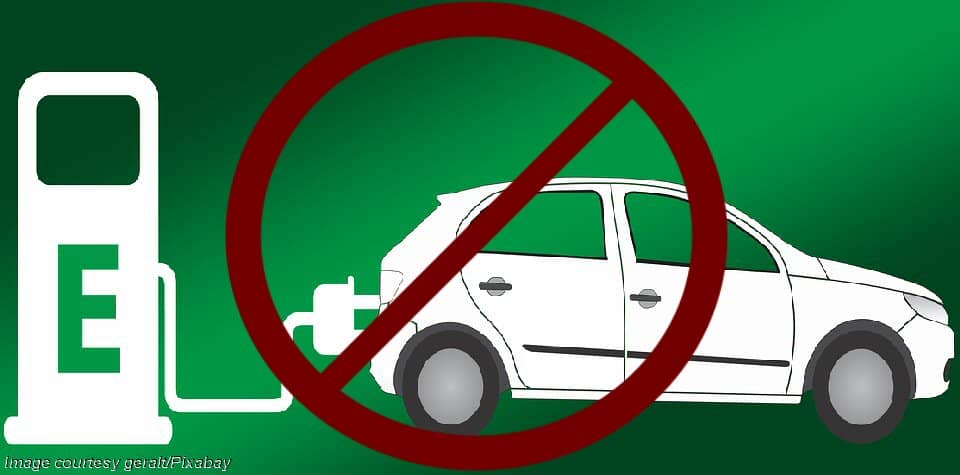EV Mandate Faces Strong Opposition From Car Dealerships

Table of Contents
Financial Concerns and Investment Challenges for Dealerships
The adoption of EVs presents significant financial challenges for car dealerships, requiring substantial upfront investment and potentially impacting profitability. The shift from gasoline-powered vehicles necessitates considerable expenditure in several key areas.
-
High Initial Costs: Dealerships need to invest in new infrastructure, including costly charging stations capable of handling various EV models and charging speeds. This is a significant capital outlay, especially for smaller dealerships with limited resources. They also require specialized tools and equipment for EV maintenance and repair, vastly different from the tools needed for gasoline cars.
-
Reduced Service Revenue: EVs require significantly less maintenance than traditional vehicles. This translates to fewer oil changes, tune-ups, and other routine servicing, leading to a potential decrease in service department revenue. This reduced revenue stream puts pressure on dealerships’ overall profitability.
-
Staff Retraining Costs: Mechanics and service technicians need extensive training to work on EVs. This includes learning about high-voltage systems, battery technology, and specialized repair techniques. The cost of retraining existing staff and hiring specialized EV technicians adds another layer of financial burden.
-
Lower Profit Margins on EV Sales: Currently, profit margins on EV sales are often lower than those for gasoline vehicles. This is due to a variety of factors, including higher initial vehicle costs and increased competition in the EV market.
Infrastructure Limitations and Consumer Readiness
Beyond the financial challenges, the widespread adoption of EVs is hampered by significant infrastructure limitations and lingering consumer concerns. These limitations directly impact dealerships’ ability to effectively sell and service EVs.
-
Lack of Charging Infrastructure: The availability of public charging stations remains inadequate in many areas, particularly in rural regions. This "range anxiety"—the fear of running out of charge before reaching a charging station—is a major deterrent for potential EV buyers. Insufficient fast-charging infrastructure further exacerbates this problem.
-
Consumer Concerns: Beyond range anxiety, many consumers are concerned about the higher initial cost of EVs, longer charging times compared to refueling gasoline vehicles, and the perceived limitations on driving range, especially for long-distance trips.
-
Impact on Dealership Sales: These infrastructure limitations and consumer anxieties directly impact dealerships' ability to sell EVs. Dealerships in areas with poor charging infrastructure struggle to attract customers, while consumer hesitancy further reduces demand.
The Impact of EV Mandates on Small and Rural Dealerships
The aggressive implementation of EV mandates disproportionately affects small and rural dealerships. These dealerships often lack the financial resources to invest in the necessary infrastructure upgrades and staff training required to sell and service EVs effectively.
-
Limited Resources and Capacity: Small dealerships may struggle to afford the significant upfront investment in charging stations, specialized tools, and employee training. They often have less access to financing options and may lack the economies of scale enjoyed by larger dealerships.
-
Low EV Demand in Rural Areas: Rural areas often have limited charging infrastructure and lower consumer demand for EVs. This makes it difficult for rural dealerships to justify the investment in EV-related infrastructure and expertise.
-
Potential for Business Closures and Job Losses: The inability to adapt to EV mandates could lead to business closures and job losses, particularly among smaller and rural dealerships. This could have significant negative consequences for local economies.
Dealerships' Advocacy and Proposed Alternatives to Current EV Mandates
Dealership associations are actively lobbying against overly aggressive EV mandates, advocating for a more gradual and balanced approach. They propose various alternatives to address the concerns outlined above.
-
Phased-in Mandates: A gradual increase in EV sales targets would give dealerships more time to adapt to the changes, easing the financial burden and allowing for a more measured transition.
-
Increased Government Support: Governments could provide more financial assistance to dealerships to help them cover the costs of installing charging stations, training staff, and adapting their facilities. This could include grants, tax credits, and low-interest loans.
-
Consumer Incentives: Stronger consumer incentives, such as tax credits or rebates, could stimulate EV demand, making it easier for dealerships to sell EVs profitably.
-
Collaboration and Partnerships: A collaborative approach between dealerships, manufacturers, and the government is crucial for developing effective solutions and ensuring a smooth transition to a more sustainable transportation sector.
Conclusion: Navigating the Complexities of the EV Mandate Debate
The transition to electric vehicles is essential for a cleaner and more sustainable future. However, the current EV mandate approach faces significant opposition from car dealerships due to considerable financial burdens, inadequate charging infrastructure, and the disproportionate impact on smaller businesses. Finding workable EV mandate solutions requires a balanced approach that acknowledges these challenges and fosters collaboration between all stakeholders. We need to move beyond simply imposing mandates and instead focus on strategies that support both environmental progress and the economic viability of the automotive retail sector. We urge you to engage in the discussion surrounding the EV mandate and share your opinions on how to address the EV mandate challenge, contributing to the development of a fair and effective policy for the future. Let’s find a workable EV mandate policy that benefits all involved.

Featured Posts
-
 Porsche 911 80 Millio Forint Az Extrak Ara
May 25, 2025
Porsche 911 80 Millio Forint Az Extrak Ara
May 25, 2025 -
 Prognozi Konchiti Vurst Schodo Peremozhtsiv Yevrobachennya 2025
May 25, 2025
Prognozi Konchiti Vurst Schodo Peremozhtsiv Yevrobachennya 2025
May 25, 2025 -
 Parisian Diplomacy Queen Wens Latest Visit
May 25, 2025
Parisian Diplomacy Queen Wens Latest Visit
May 25, 2025 -
 The Trump Factor Shaping Republican Negotiations
May 25, 2025
The Trump Factor Shaping Republican Negotiations
May 25, 2025 -
 Apple Stock Navigating Key Levels Ahead Of Q2 Earnings
May 25, 2025
Apple Stock Navigating Key Levels Ahead Of Q2 Earnings
May 25, 2025
Latest Posts
-
 Dr Terrors House Of Horrors A Complete Guide
May 25, 2025
Dr Terrors House Of Horrors A Complete Guide
May 25, 2025 -
 Pride And Prejudice Returns Donald Sutherlands Performance Re Examined
May 25, 2025
Pride And Prejudice Returns Donald Sutherlands Performance Re Examined
May 25, 2025 -
 3 Time Oscar Nominee To Play President Snow In Hunger Games Prequel
May 25, 2025
3 Time Oscar Nominee To Play President Snow In Hunger Games Prequel
May 25, 2025 -
 Hunger Games Prequel Casts Oscar Nominated Star As President Snow
May 25, 2025
Hunger Games Prequel Casts Oscar Nominated Star As President Snow
May 25, 2025 -
 Pride And Prejudice Re Release Why Donald Sutherland Is The Best Part
May 25, 2025
Pride And Prejudice Re Release Why Donald Sutherland Is The Best Part
May 25, 2025
